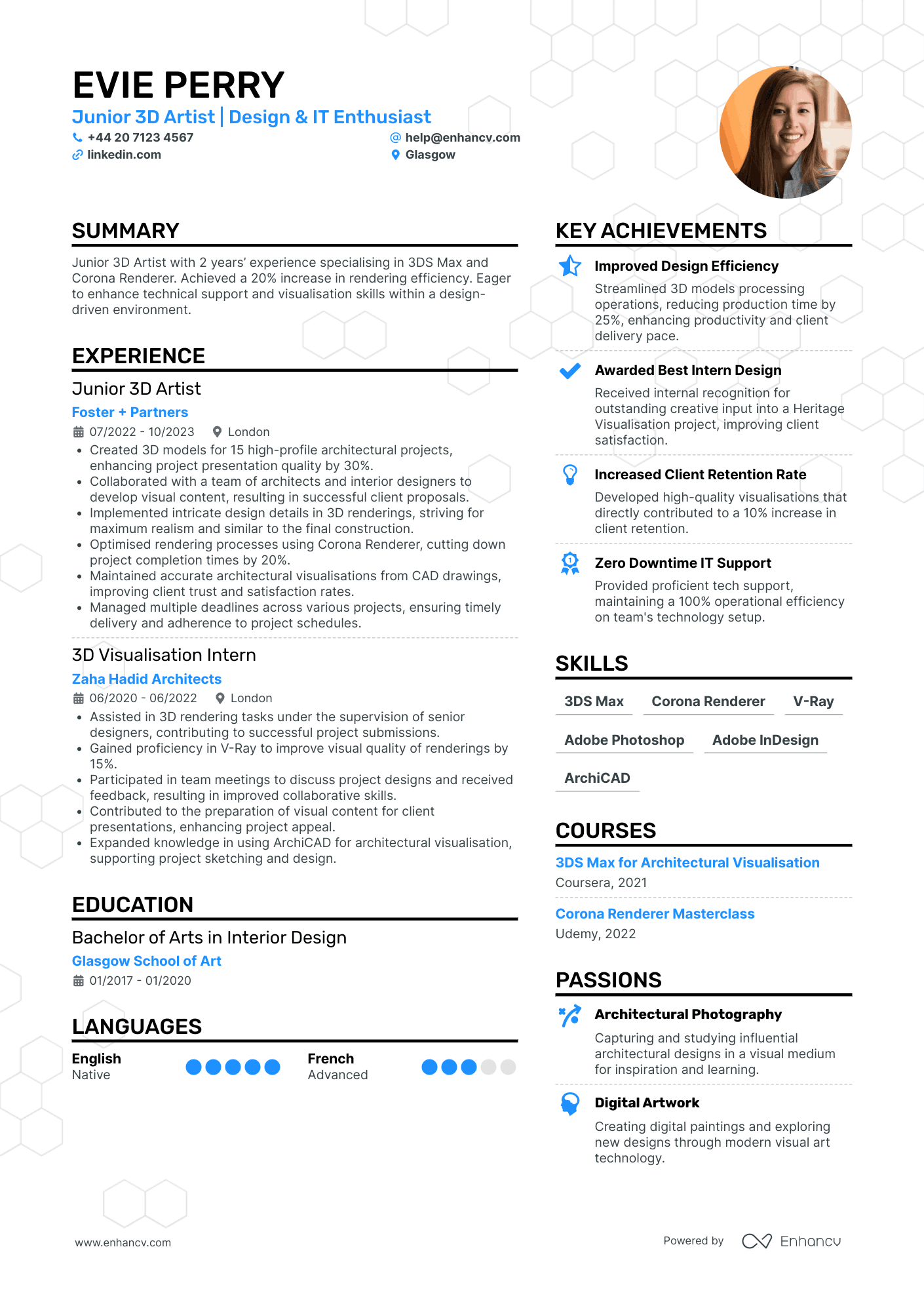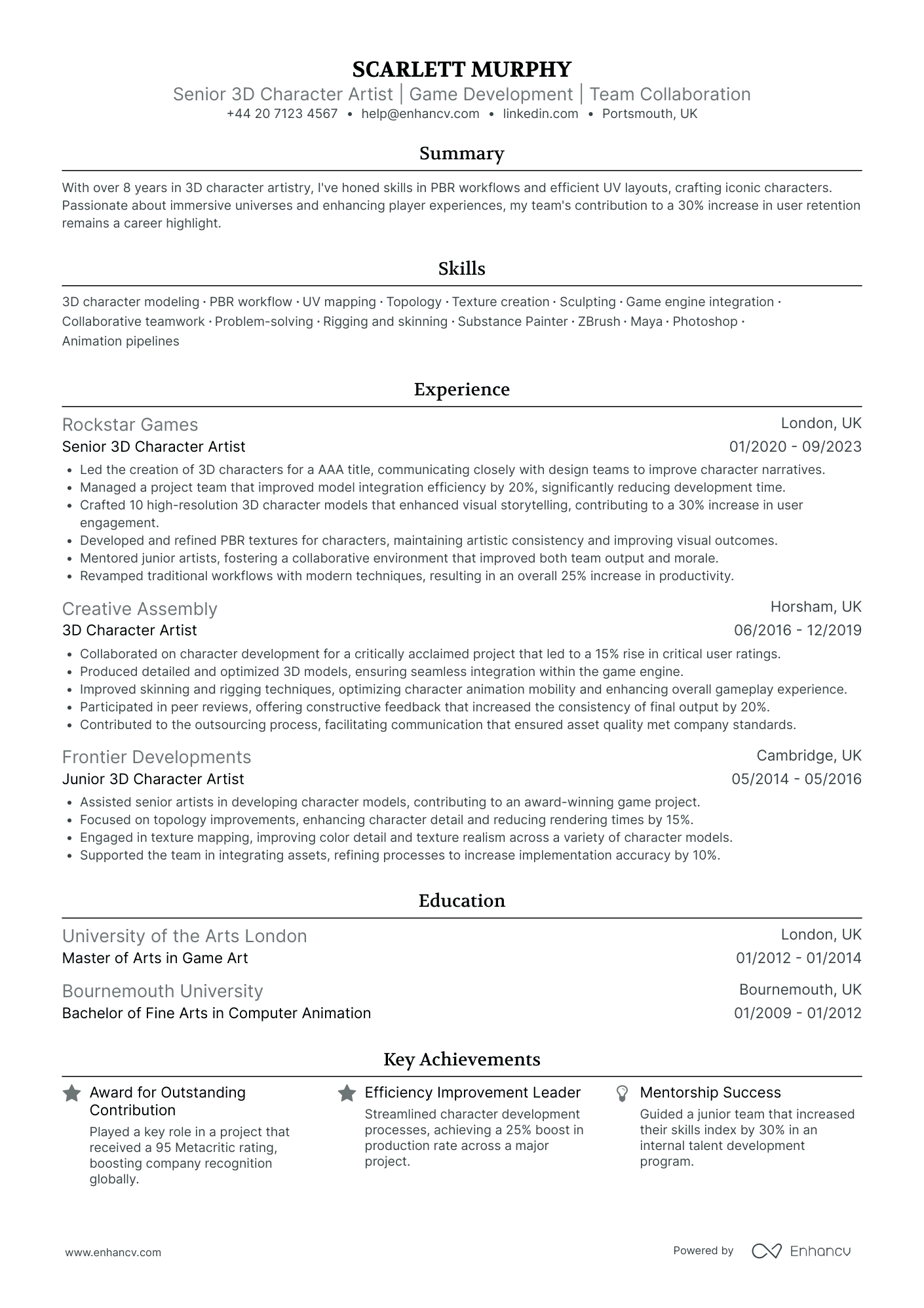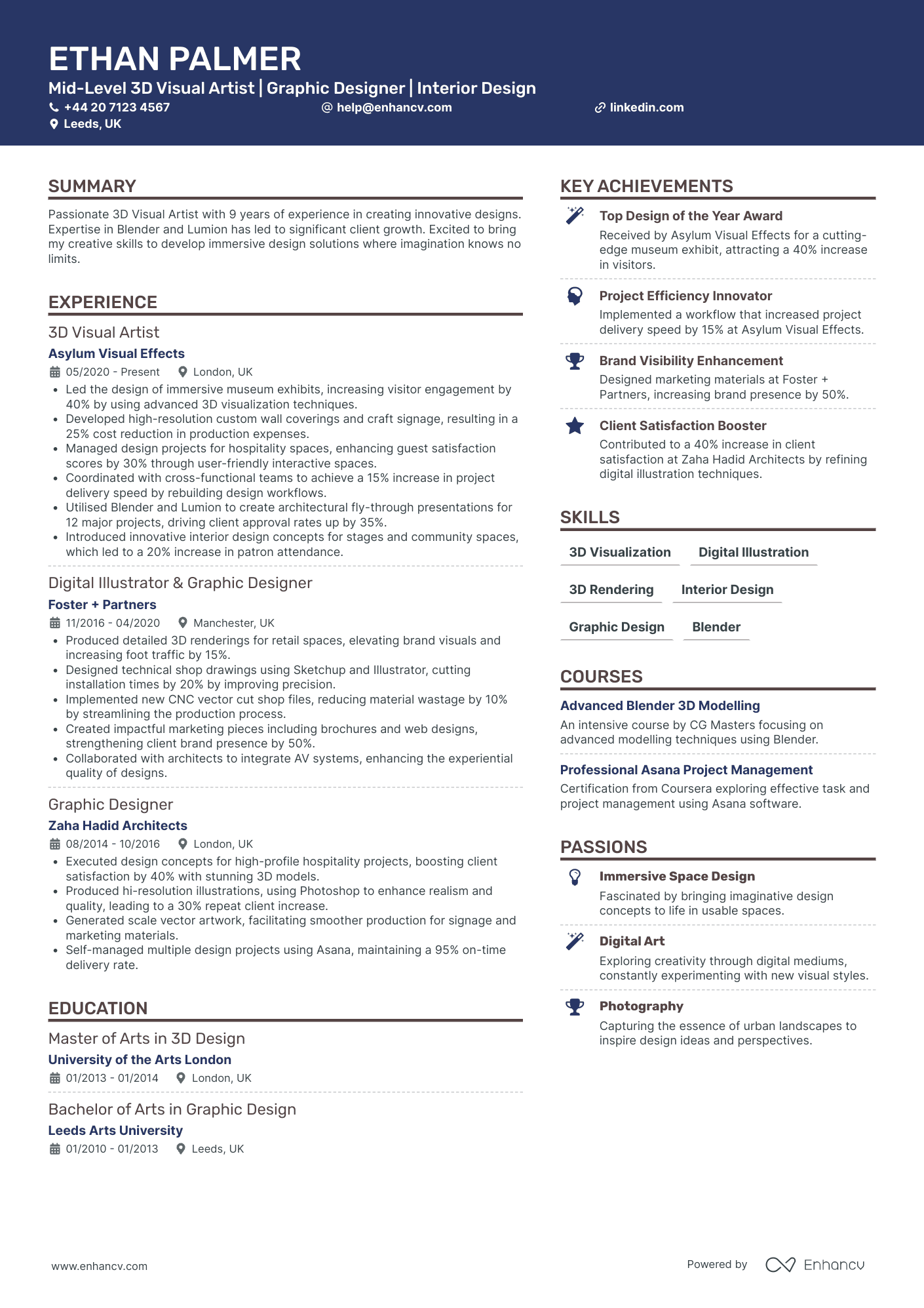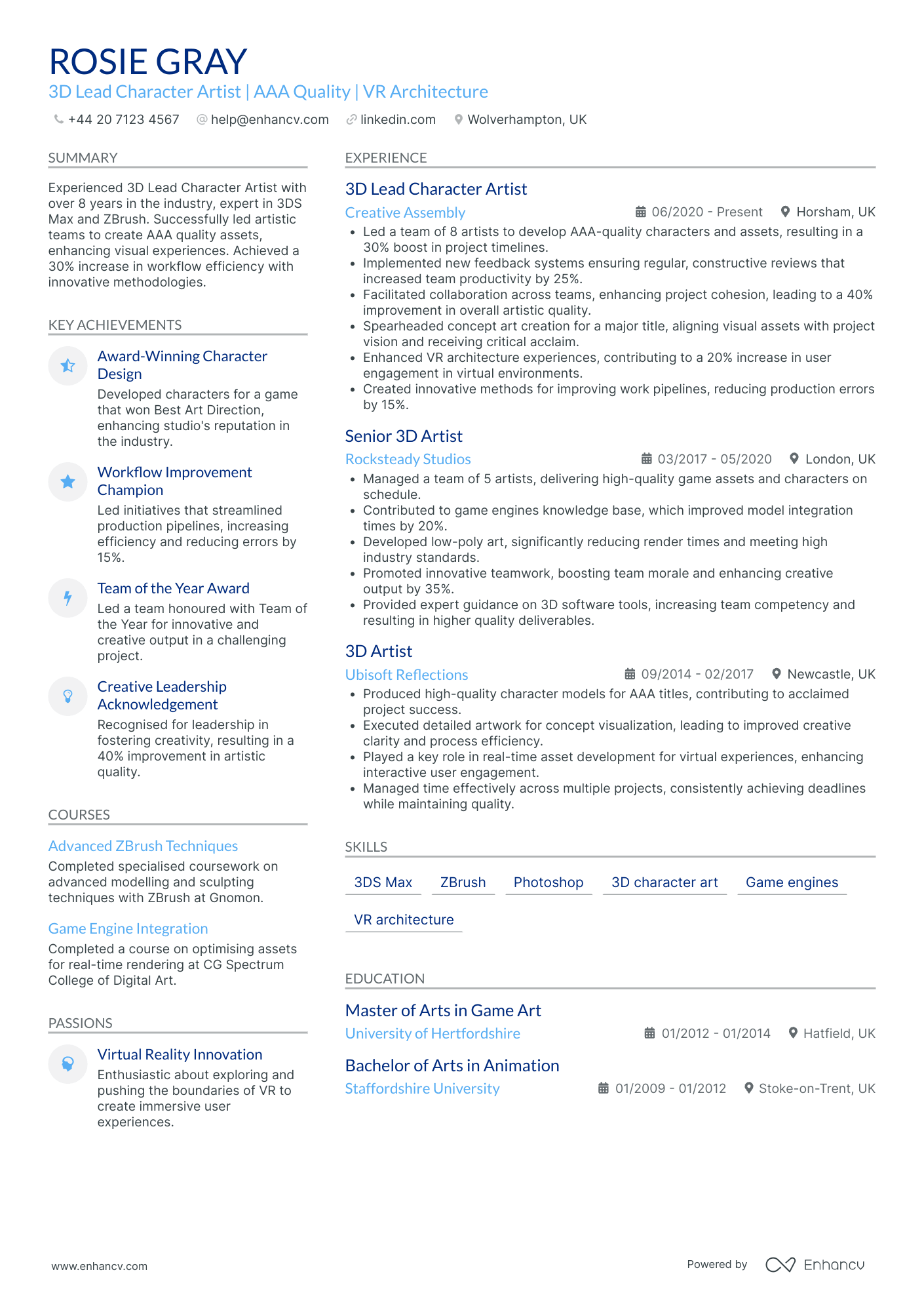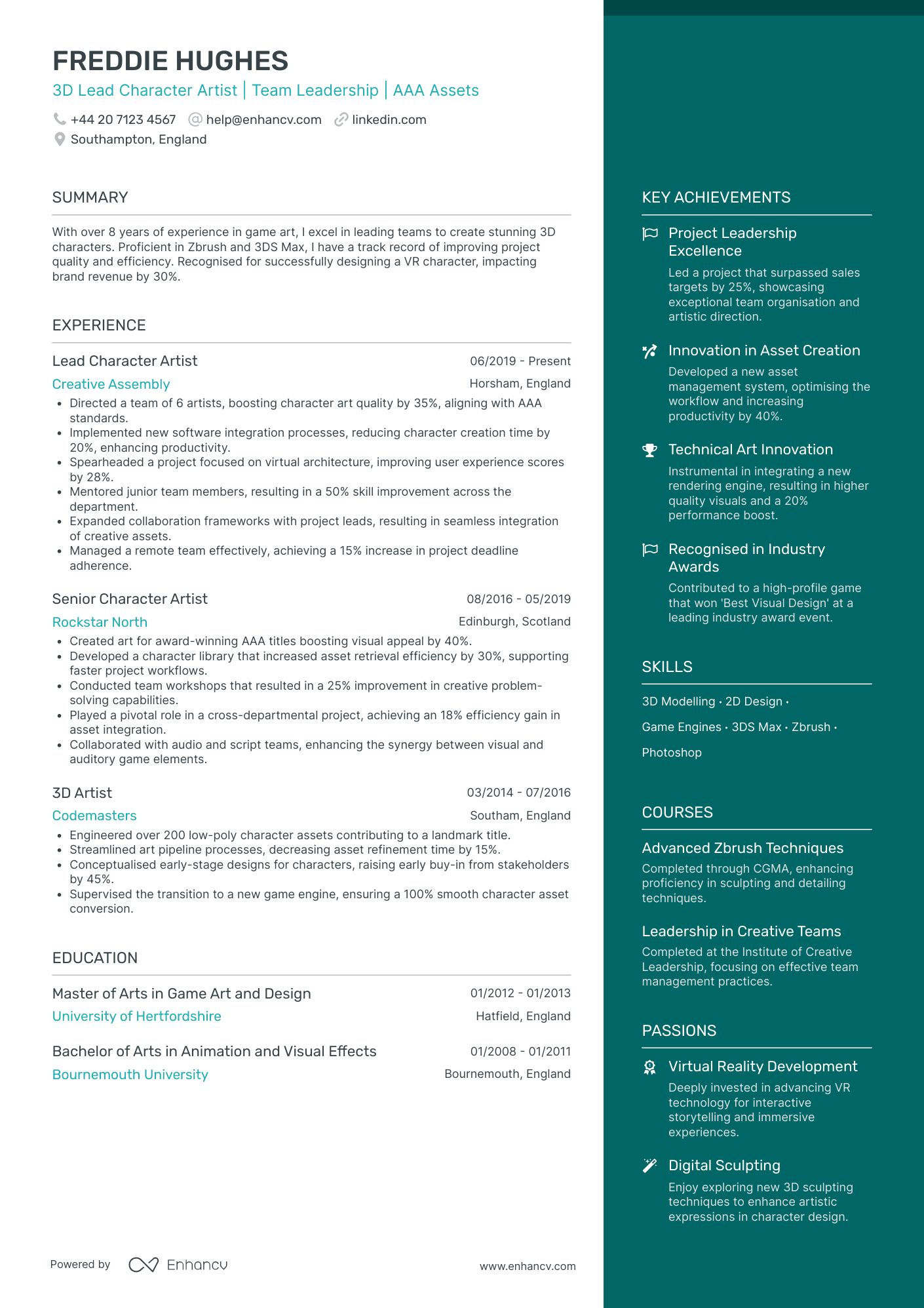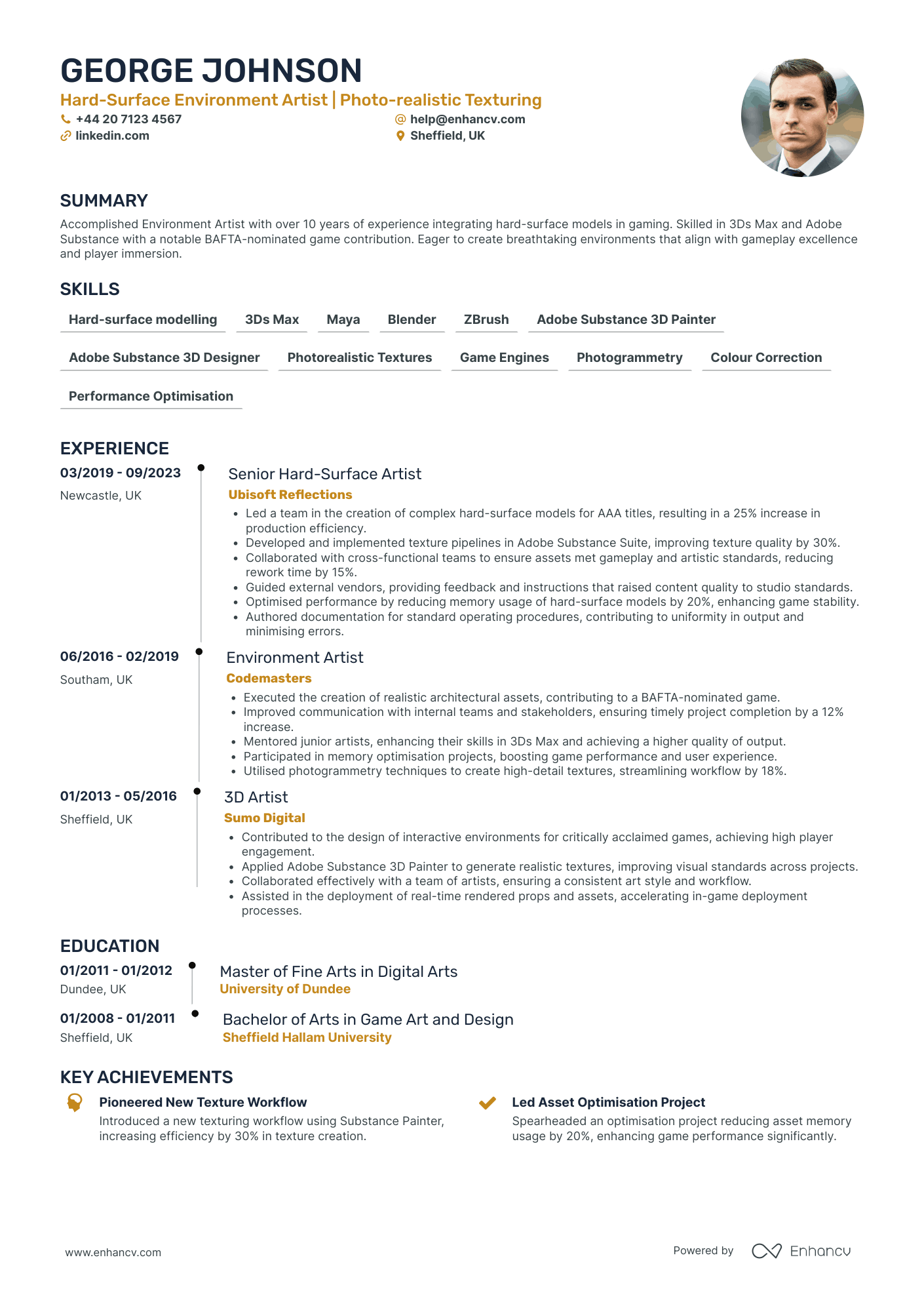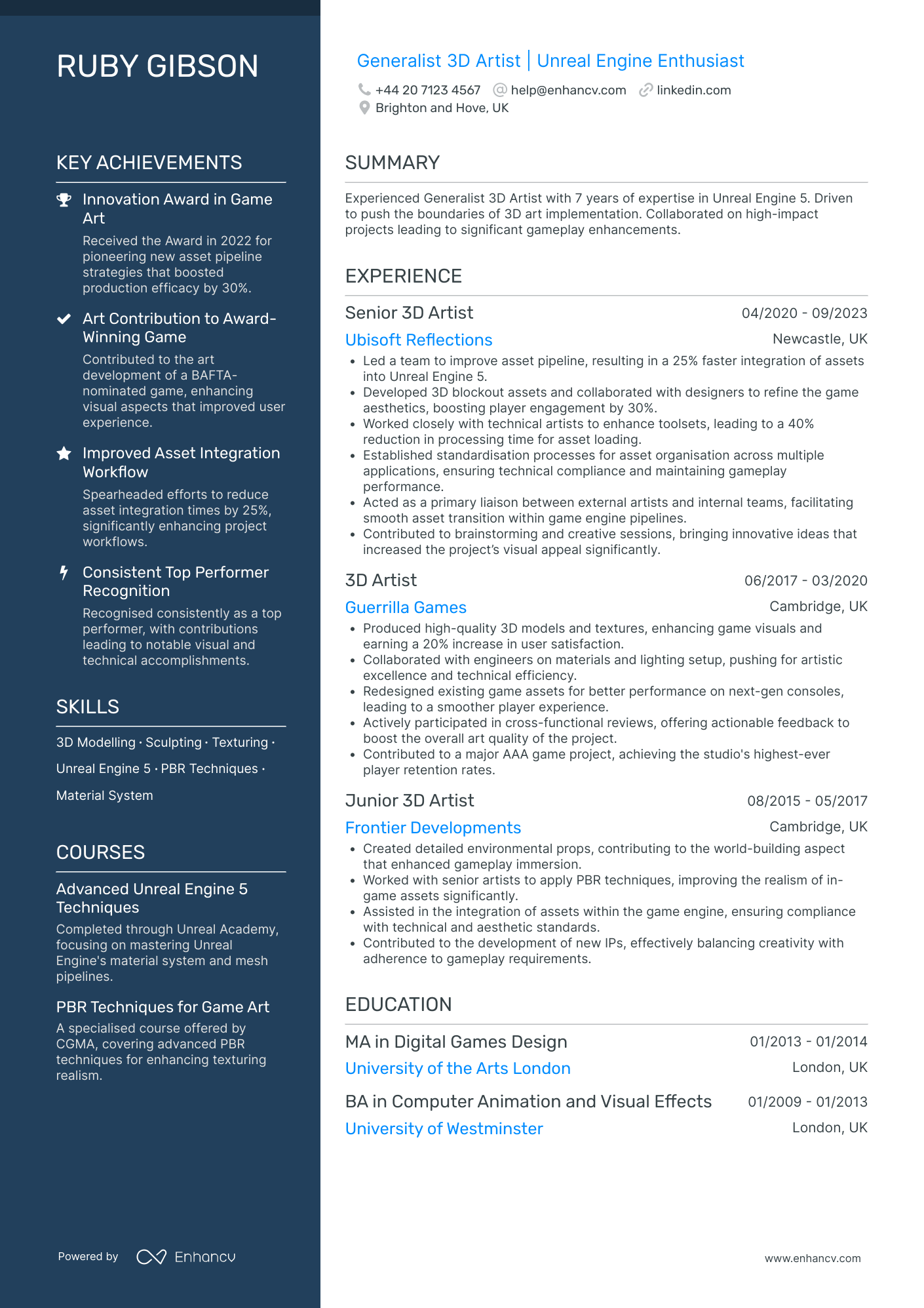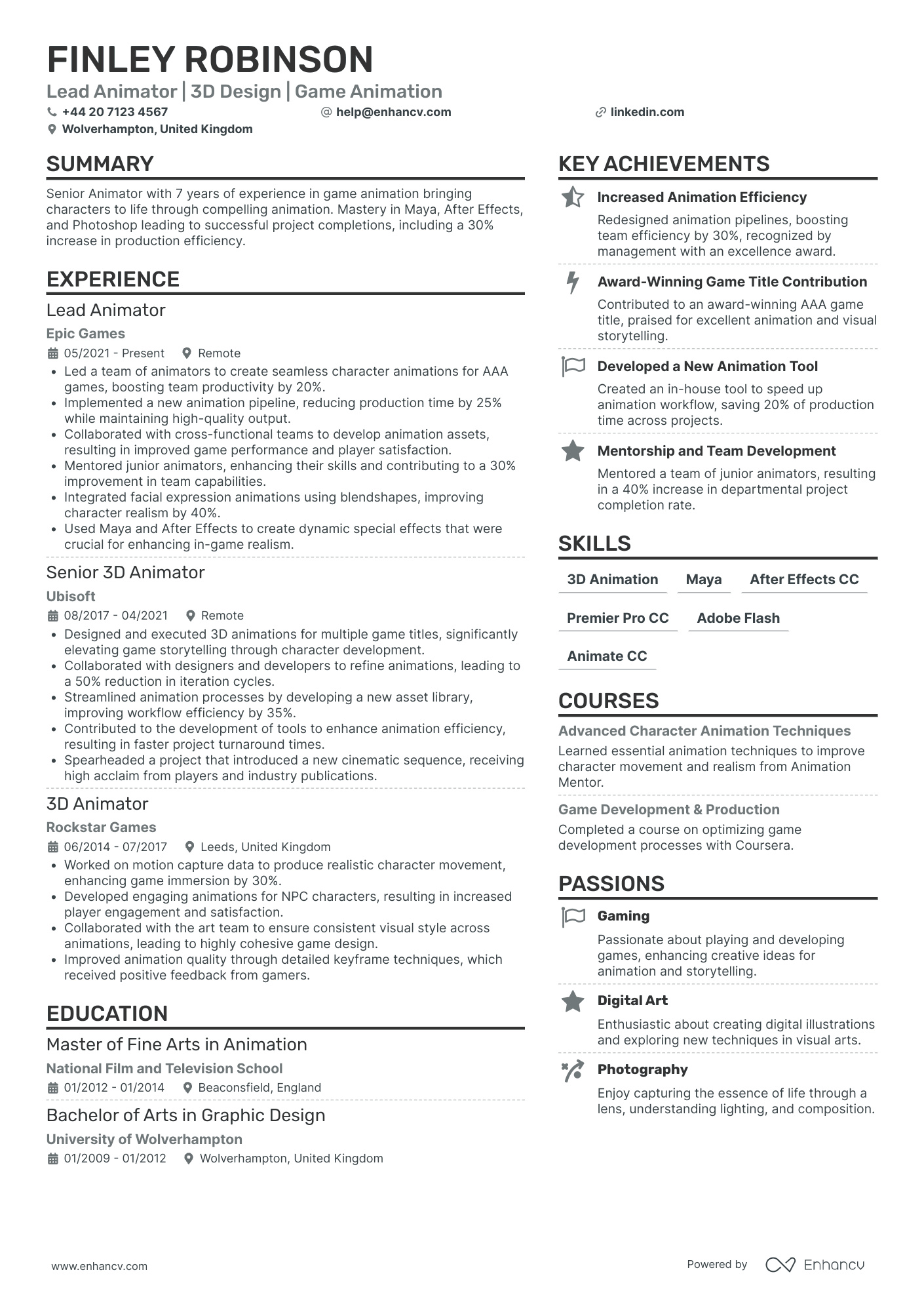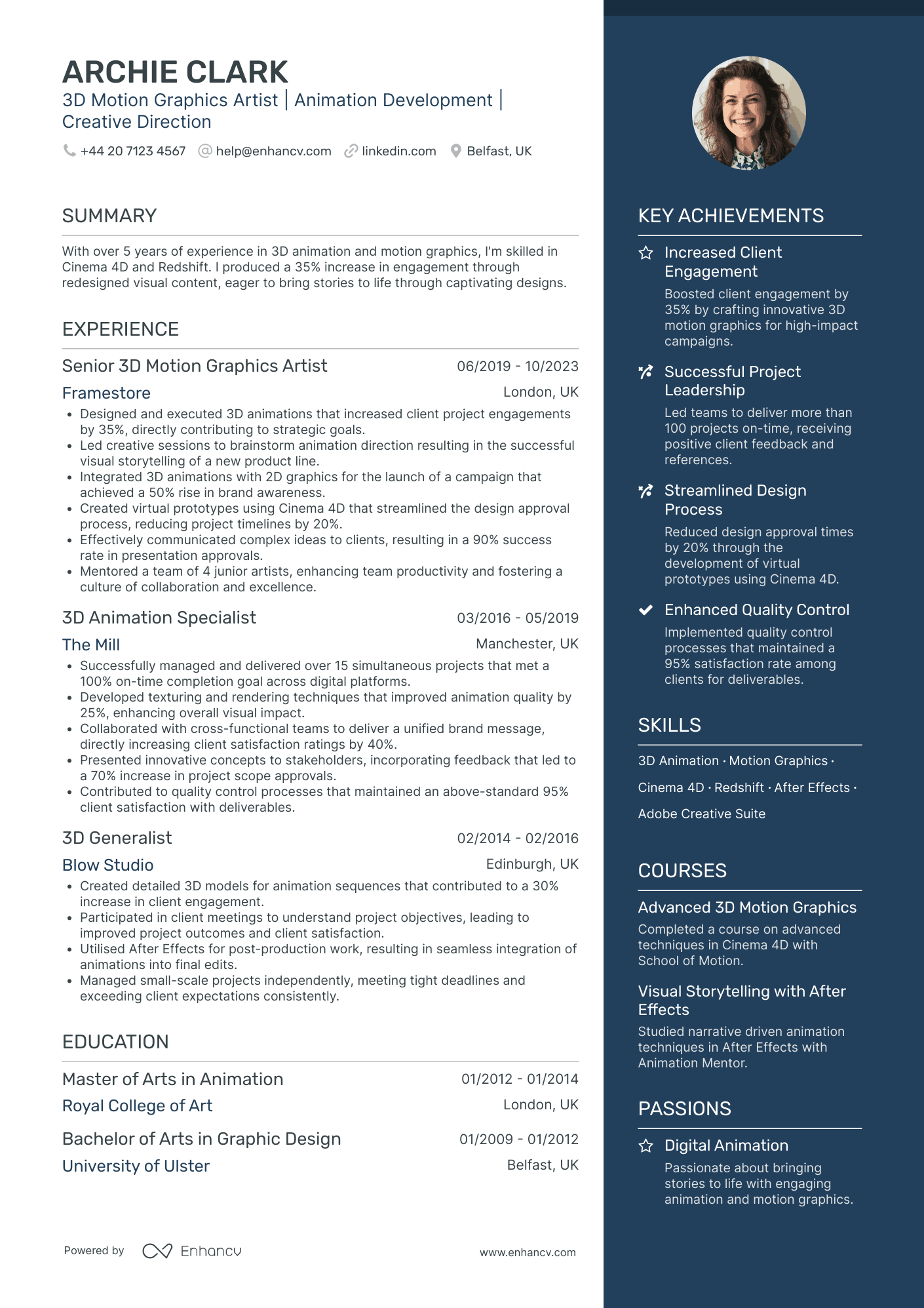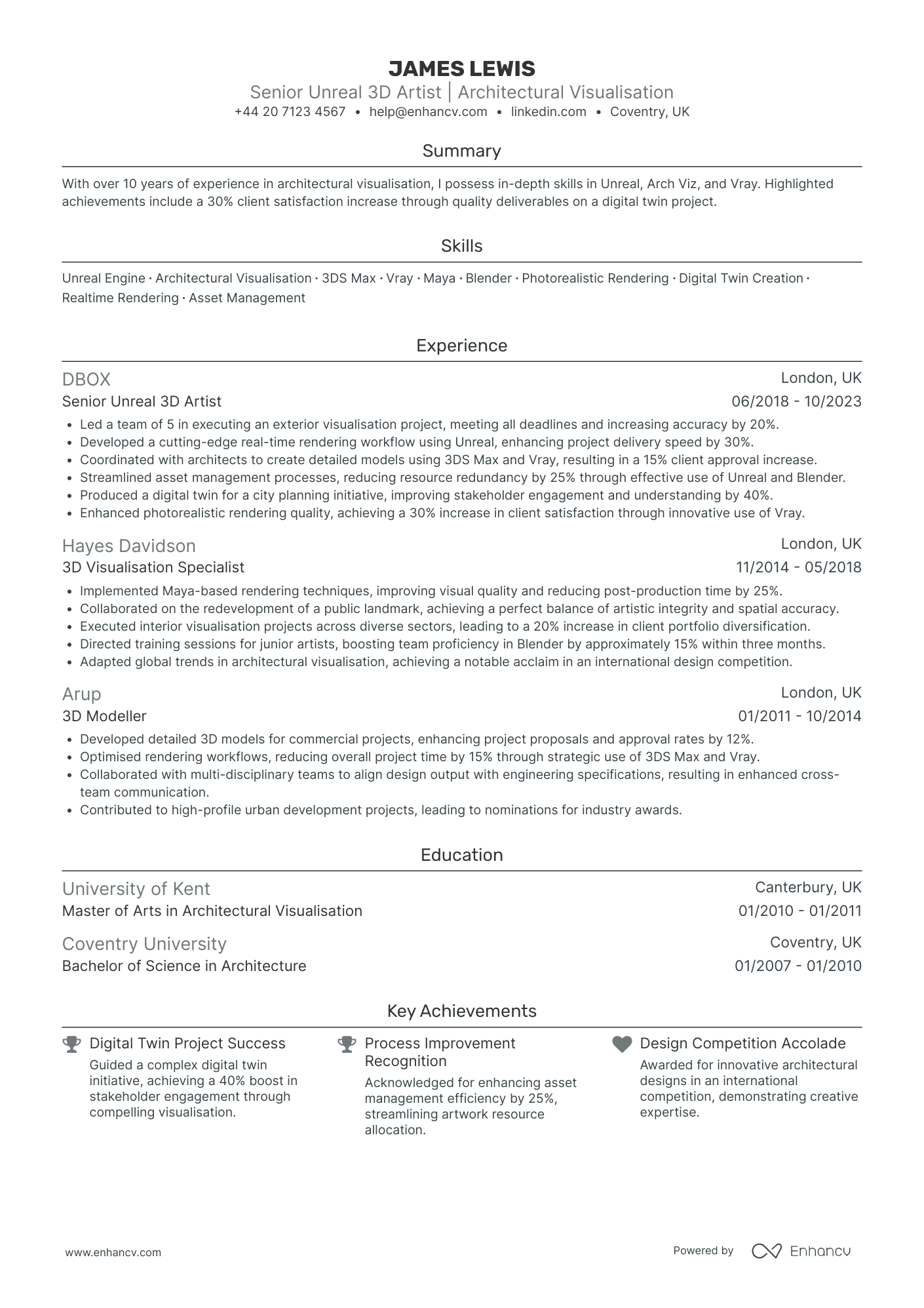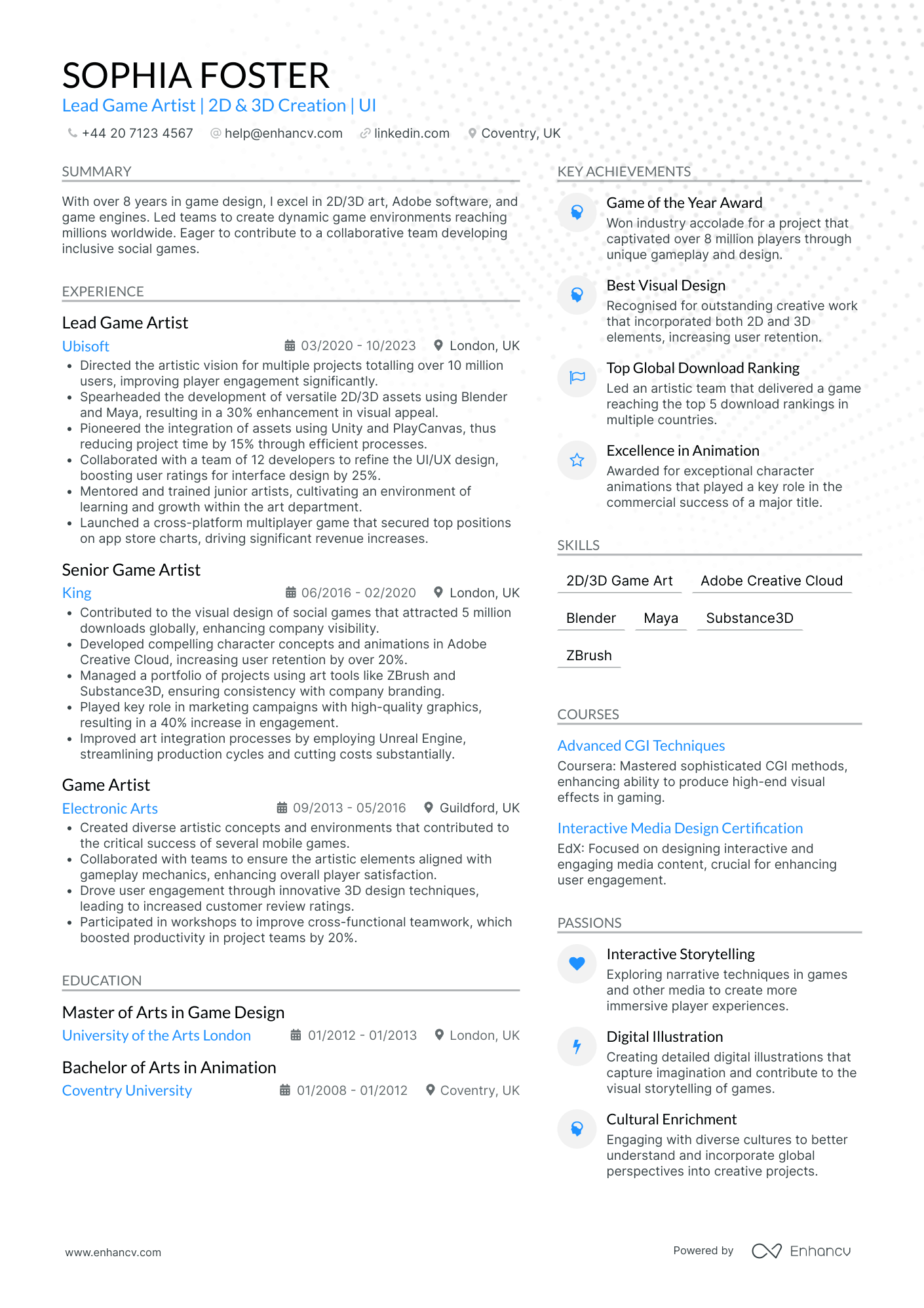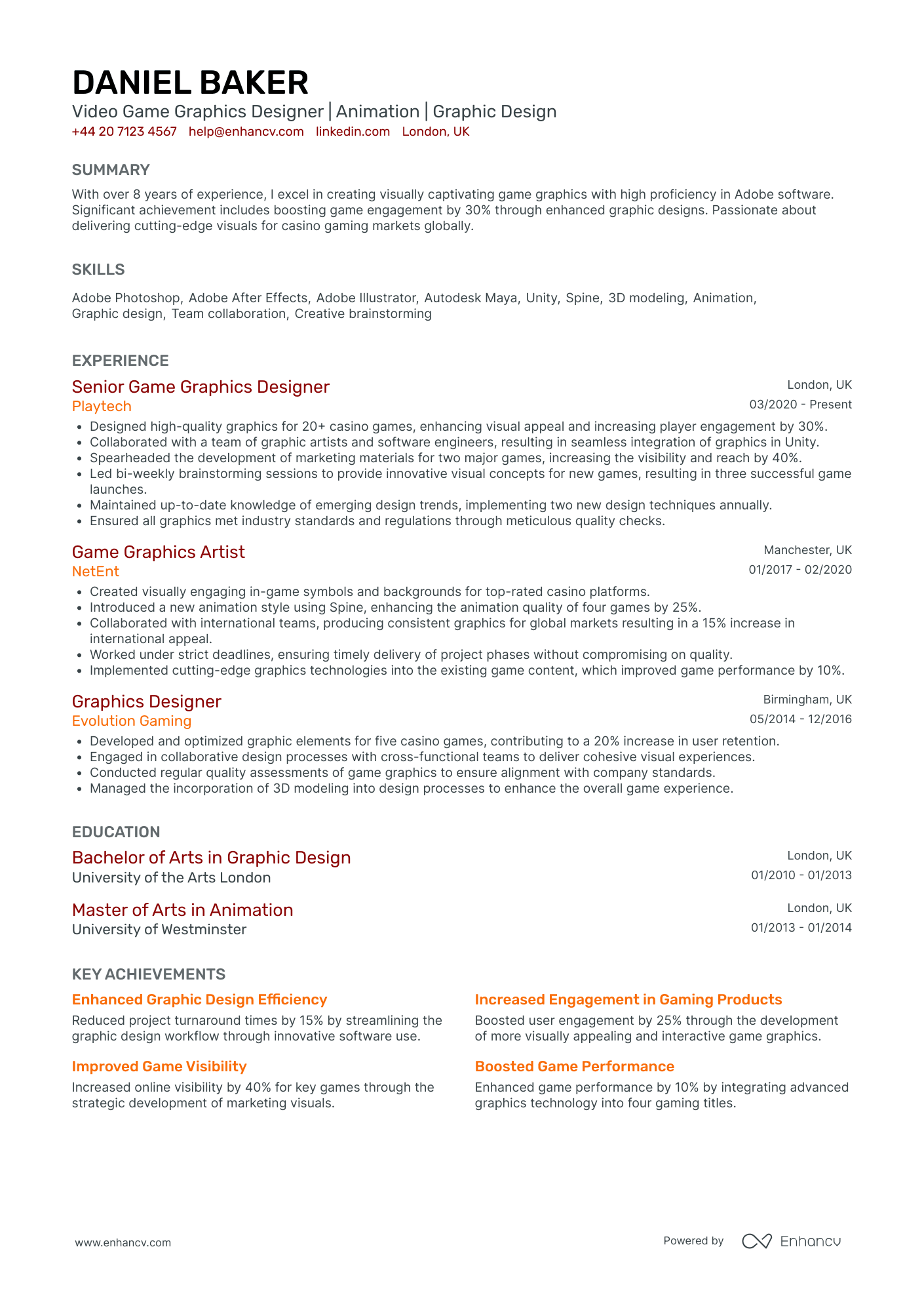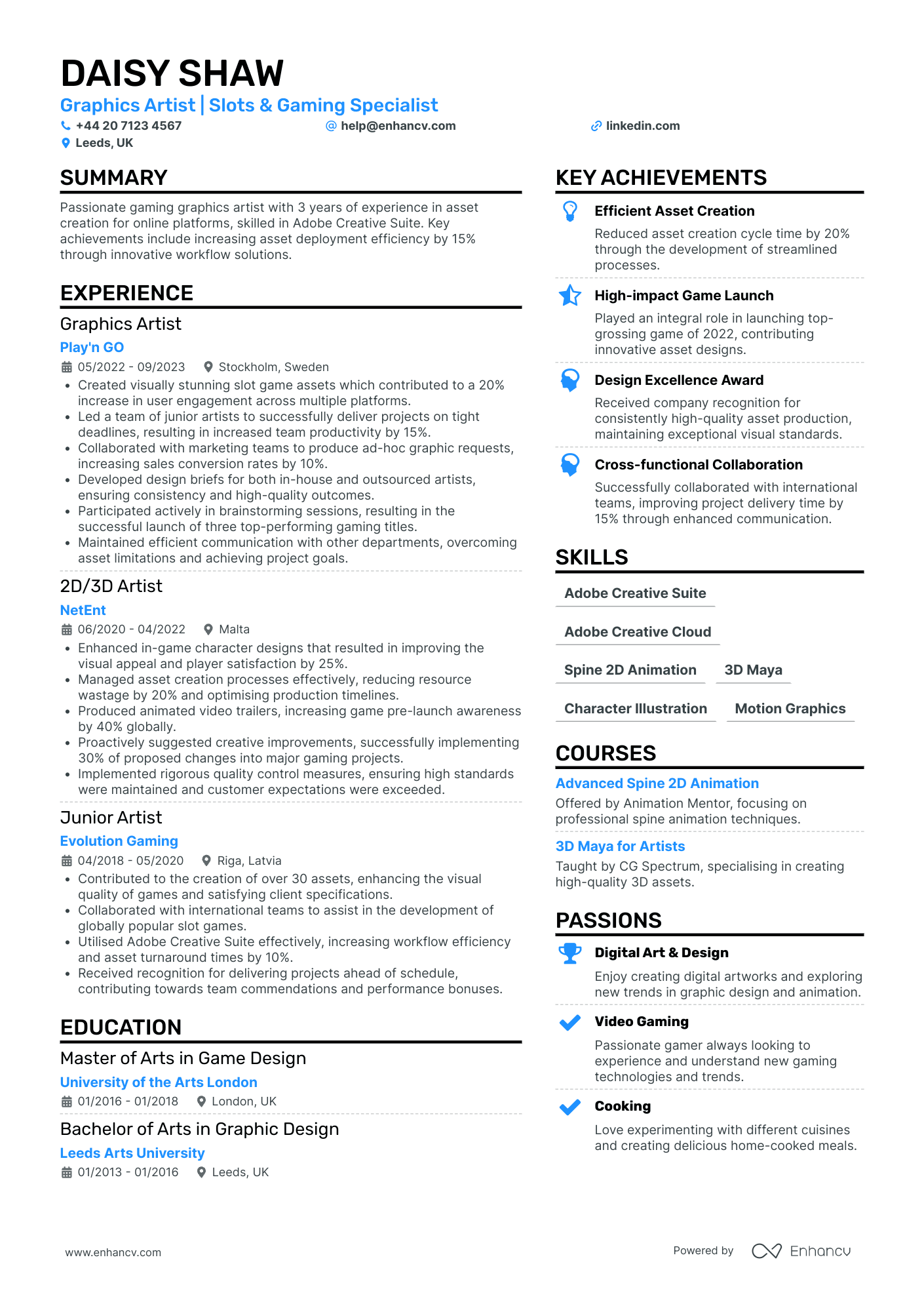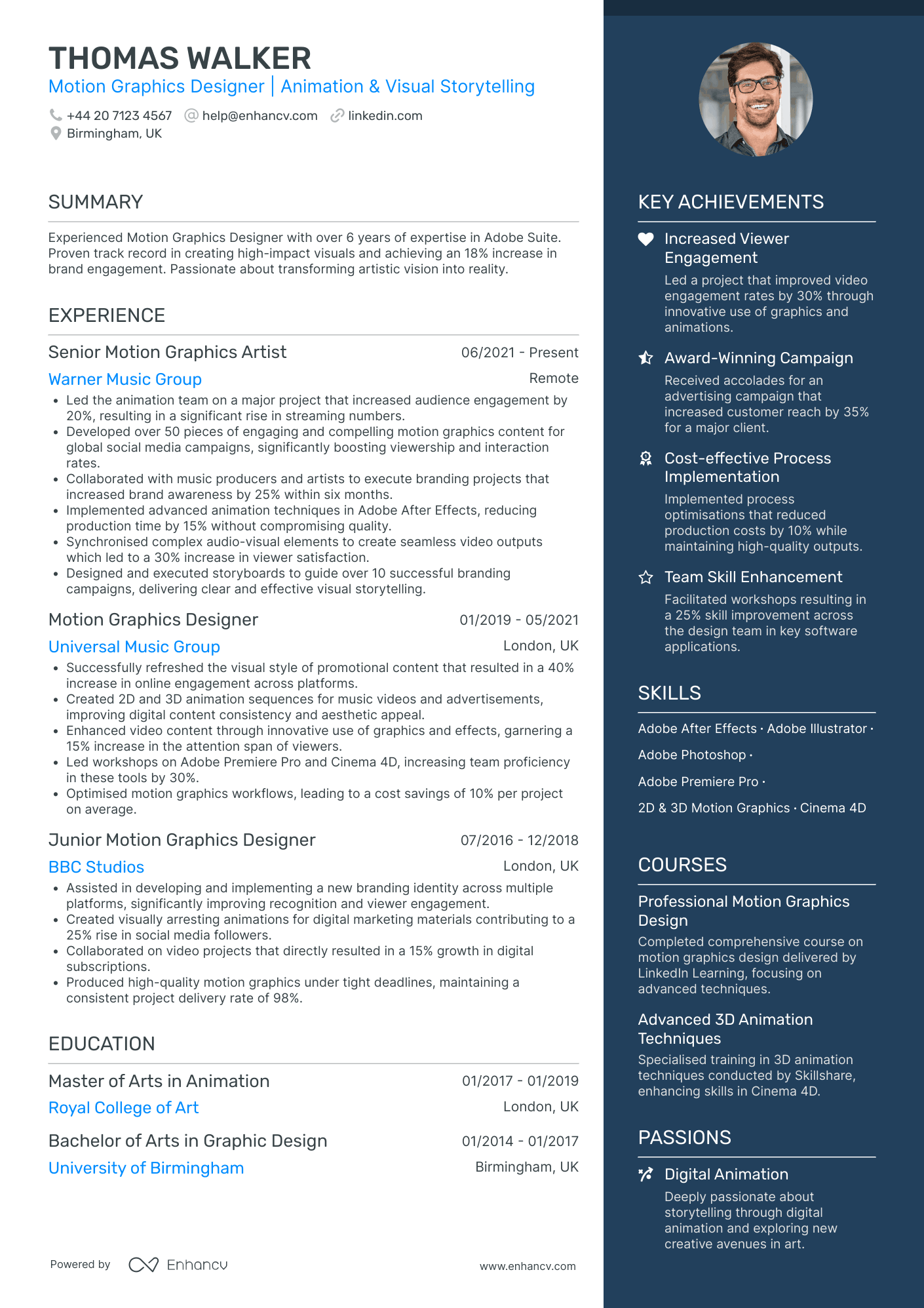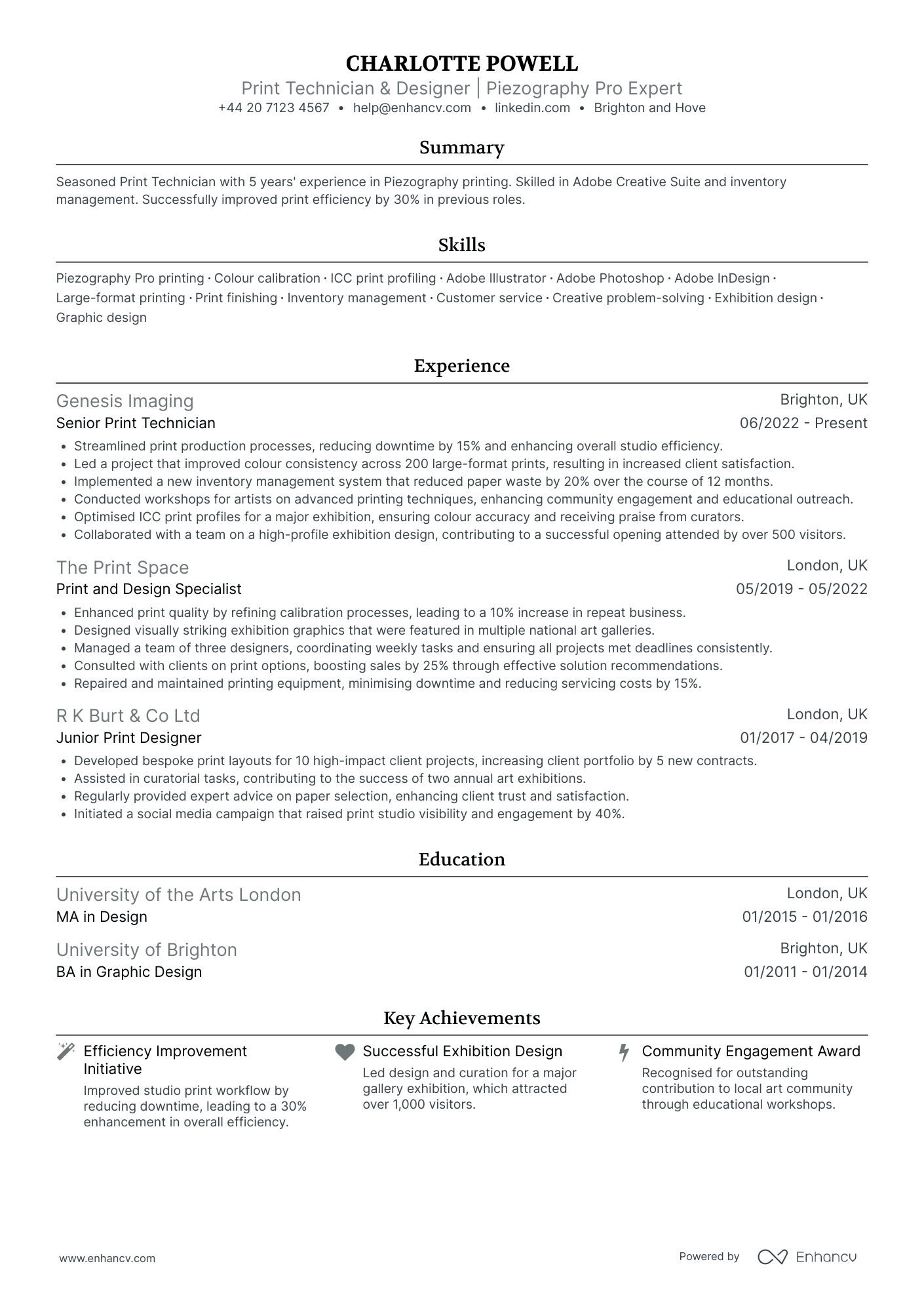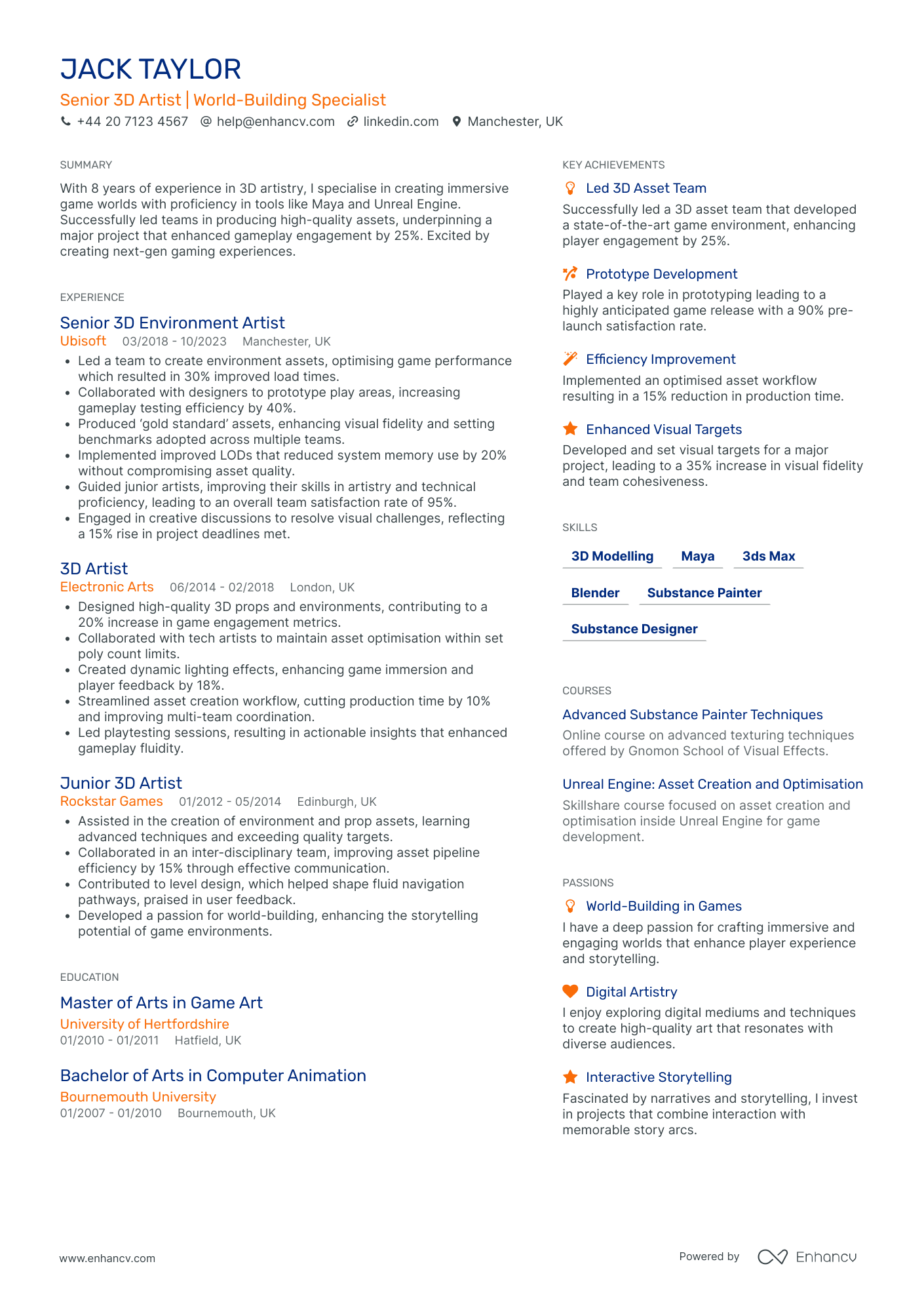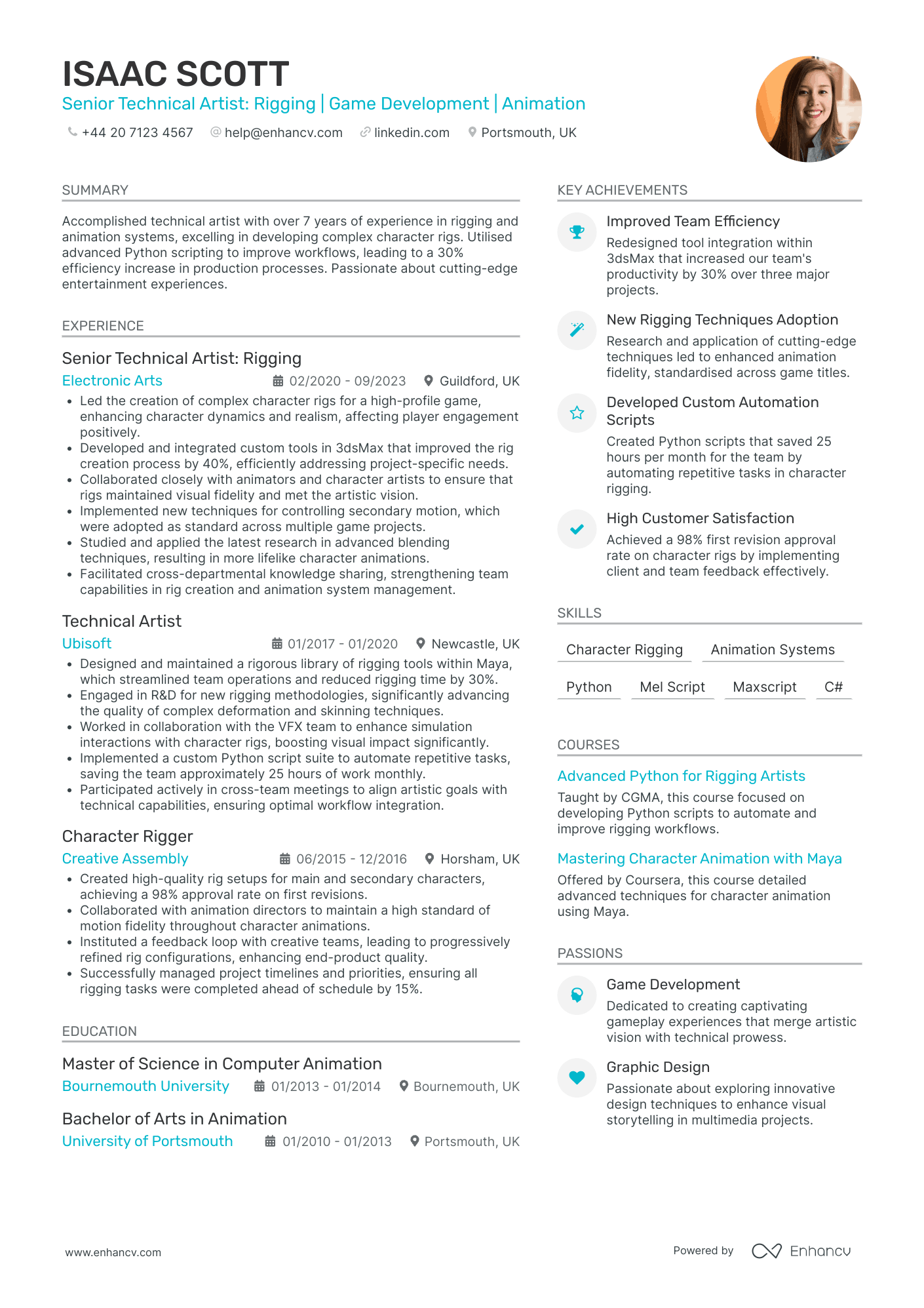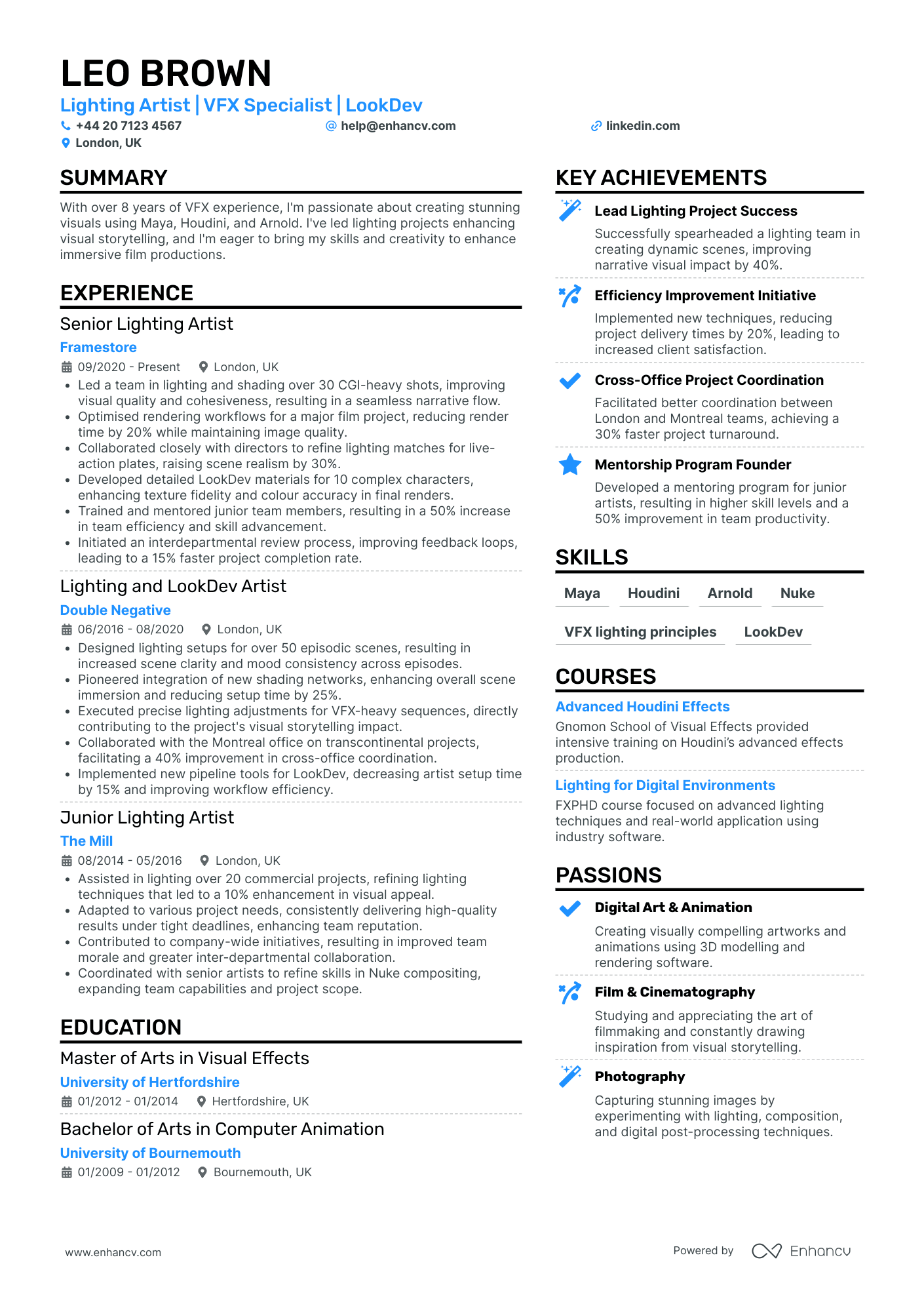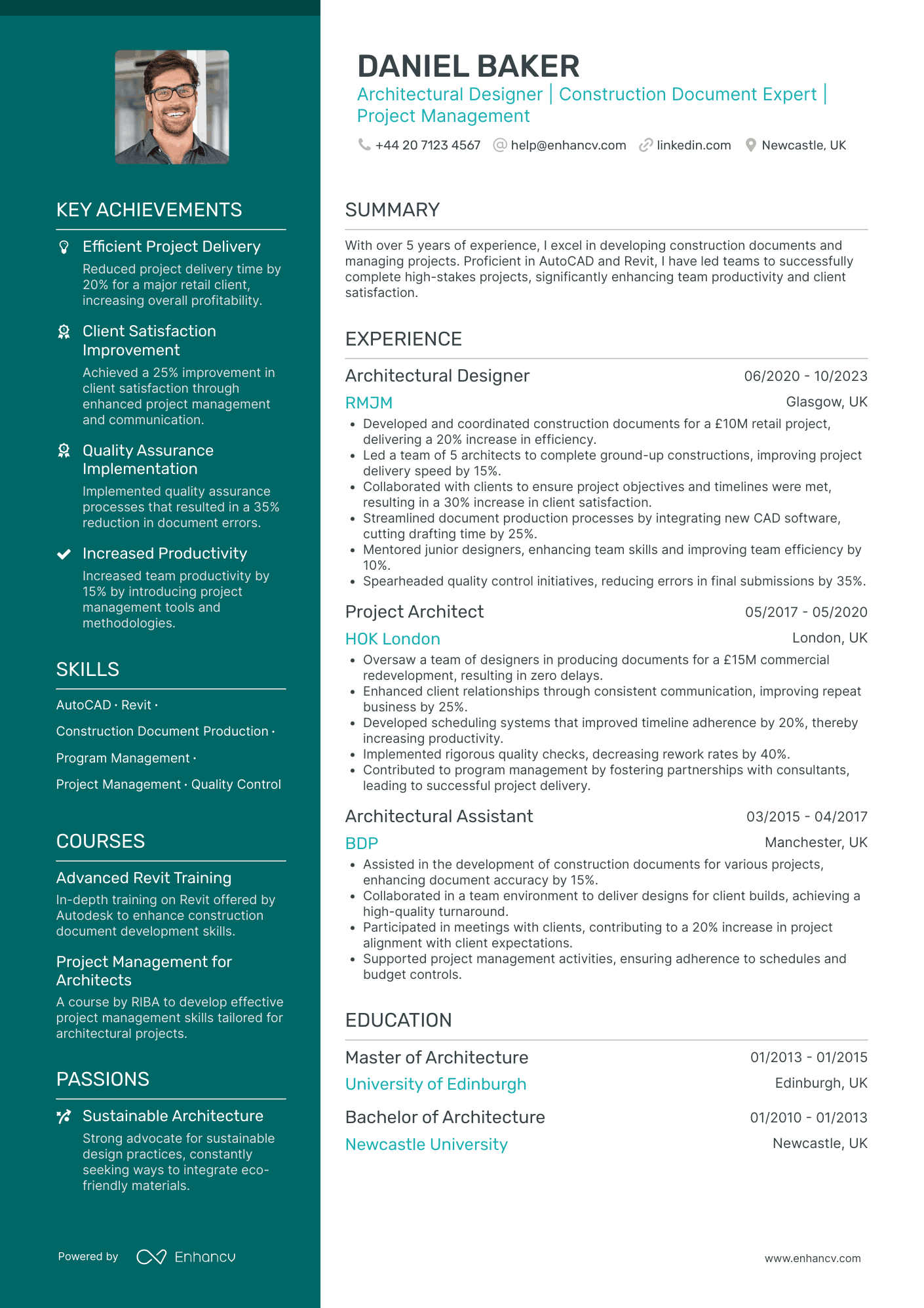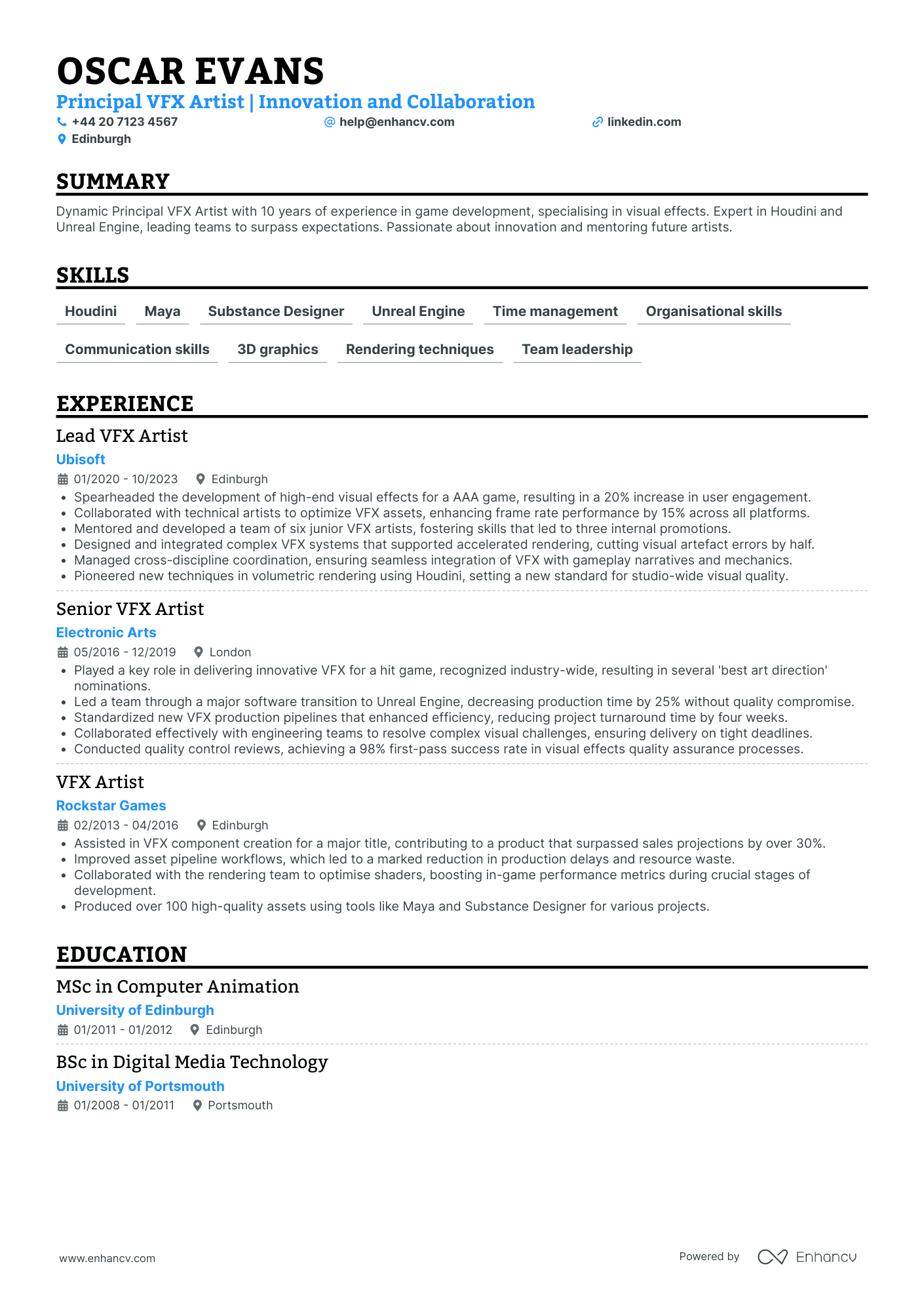Staying abreast of the latest software updates and industry trends is a significant CV challenge for 3D artists. Our guide offers practical advice and strategies to continually update your skills and refine your portfolio, ensuring you stand out in a competitive job market.
- Applying best practices from real-world examples to ensure your profile always meets recruiters' expectations;
- What to include in your work experience section, apart from your past roles and responsibilities?
- Why are both hard and soft skills important for your application?
- How do you need to format your CV to pass the Applicant Tracker Software (ATS) assessment?
If you're writing your CV for a niche 3d artist role, make sure to get some inspiration from professionals:
Resume examples for 3d artist
By Experience
Junior 3D Artist
- Chronicles a Dynamic Career Path - The CV effectively narrates a career trajectory with a clear progression from junior roles to senior management positions in the tech industry. It highlights the candidate's steady advancement by showcasing their transition from a software developer to a project lead, and ultimately to a head of department, reflecting both growth and mastery of increasingly complex responsibilities.
- Utilizes Industry-Specific Practices - What sets this CV apart is its detailed depiction of industry-standard methodologies and tools unique to engineering management. Mentioning agile frameworks, Scrum methodologies, and proficiency in tech tools such as Jira and AWS demonstrates the candidate's technical depth and familiarity with modern project management strategies, reassuring potential employers of their capability to operate within fast-paced tech environments.
- Showcases Adaptability and Cross-Functional Expertise - The CV underscores the candidate's versatility by illustrating their ability to work effectively across various teams and departments. It describes successful collaborations with marketing, design, and sales teams, highlighting a strategic mindset and a strong ability to foster cross-functional synergies that drive organizational success.
Senior 3D Artist
- Clear and Focused Content Presentation - The CV is structured clearly, allowing Scarlett's extensive experience and skills to be conveyed concisely. Information is organized logically, with sections such as experience, education, and skills seamlessly guiding the reader through her professional journey.
- Progressive Career Trajectory - Scarlett demonstrates significant professional growth from her initial role as a Junior 3D Character Artist to her current senior position at Rockstar Games. This trajectory highlights her skill advancement, leadership capabilities, and her increasing impact on higher-profile projects within the gaming industry.
- In-Depth Industry-Specific Skillset - The CV showcases a robust proficiency in industry-standard tools and methodologies such as PBR workflow, game engine integration, and software like ZBrush and Maya. Scarlett's technical depth is evident in her ability to enhance visual storytelling through modern techniques, making her an invaluable asset to game development teams.
Mid-Level 3D Artist
- Clarity and Structure in Content Presentation - Ethan Palmer's CV is expertly structured, allowing readers to easily navigate through various sections. Each segment, from professional experience to skills and education, is clearly delineated, creating a logically flowing narrative that highlights his diverse expertise, making it easy for potential employers to find key information quickly.
- Progressive Career Trajectory with Industry Shifts - The CV effectively illustrates Palmer's career growth from a Graphic Designer to a Mid-Level 3D Visual Artist. His career shows a fascinating shift from traditional graphic design at Zaha Hadid Architects to embracing 3D visualization and interior design at Asylum Visual Effects, showcasing a clear path of upward mobility and expanding skill sets.
- Technical Depth in Industry-Specific Tools - Palmer's proficiency in advanced tools like Blender, Lumion, and Substance Painter, along with his knowledge in Adobe's suite (Illustrator and Photoshop), emphasizes his technical expertise. These industry-standard tools demonstrate his capabilities in producing high-quality 3D visualizations and digital illustrations, which are critical for roles in visual arts and design.
Lead 3D Artist
- Clarity in Content Presentation - The CV is effectively structured, ensuring clarity and conciseness in each section. The experience details are well-organized with bullet points highlighting specific responsibilities and achievements, which makes it easy for potential employers to quickly assess the candidate’s qualifications.
- Career Trajectory Showcases Progressive Growth - Rosie Gray’s career path is marked by significant promotions and growth within the gaming industry. Beginning as a 3D Artist and advancing to a Lead Character Artist, her trajectory reflects a steady rise to leadership, indicative of her expanding capabilities and increasing responsibilities over time.
- Specialized Tools and Methodologies Illustrate Industry Expertise - The CV highlights Rosie’s proficiency with industry-specific tools like 3DS Max and ZBrush, as well as her capability in integrating new feedback systems and innovative methodologies. Her expertise in these areas demonstrates a deep technical knowledge and ability to utilize advanced tools to produce AAA quality assets.
By Role
3D Character Artist
- Structured and Concise Content Presentation - The CV is well-organized with clear sections that allow for quick skimming. Each job entry begins with the job title, company, location, and dates, followed by bullet points highlighting specific responsibilities and achievements. This structure makes it easy to identify the candidate's progress and contributions seamlessly.
- Progressive Career Trajectory - Freddie Hughes has experienced steady career progression, moving from a 3D Artist to Senior Character Artist, and now Lead Character Artist. This upward movement demonstrates the candidate's ability to take on increased responsibility and leadership roles, showcasing a strong trajectory in the competitive gaming industry. Freddie’s path also indicates industry recognition and trust in his skills.
- Outstanding Achievements and Business Impact - The CV provides detailed achievements that reflect significant business impact. For instance, the candidate's work on a VR character design led to a 30% increase in brand revenue, while leadership in a team at Creative Assembly resulted in enhancing character art quality by 35%. These examples effectively link artistic skills to measurable business success.
3D Environment Artist
- Career Growth and Versatility - The CV illustrates an impressive career trajectory enhanced by continuous promotions within recognized firms. Starting as a sales associate and advancing to a managerial level demonstrates the candidate's ability to adapt and thrive in a competitive environment. The document effectively maps out this professional growth, showcasing both upward movement and the candidate's expanding responsibilities over time.
- Rich in Industry-Specific Technical Knowledge - A distinct feature of this CV is the depth of industry-specific knowledge demonstrated through the use of cutting-edge technology and methodologies like Lean Six Sigma and Agile. These competencies are particularly noteworthy for roles requiring precise technical skill and process optimization, thereby establishing the candidate as a technically adept professional in engineering and manufacturing sectors.
- Comprehensive Sections Aligned with Role Requirements - This CV is meticulously structured, featuring sections that align with core responsibilities of the target role: Experience, Skills, Certifications, and Projects. Each section is meticulously detailed yet concise, providing a holistic view of the candidate's capability to meet specific industry demands. Furthermore, the inclusion of relevant certifications underscores their commitment to continuous professional development.
3D Modelling Artist
- Strategic Career Progression - The CV illustrates a definitive trajectory of career growth, moving from a Junior 3D Artist to a Senior role. This progression within major companies like Ubisoft Reflections and Guerrilla Games highlights a robust career development supported by industry-relevant experience. The upward mobility emphasizes the candidate's increasing responsibility and expertise in the field.
- Soft Skills and Leadership Attributes - With numerous references to leadership activities such as leading teams and being the primary liaison between external and internal teams, Ruby demonstrates a strong capacity for leadership. The CV also showcases effective communication and collaboration skills, which are crucial in successfully coordinating cross-functional projects in complex environments like game development.
- Innovative Use of Advanced Tools - The CV highlights the candidate's expertise with industry-specific tools such as Unreal Engine 5 and advanced PBR techniques. These tools are crucial for modern 3D art creation and demonstrate the candidate’s deep technical abilities, allowing for the creation of visually stunning and technically seamless game environments.
3D Animation Artist
- Strategic Leadership in Animation - Finley Robinson's CV demonstrates exceptional leadership skills, evident through his role as a Lead Animator at Epic Games where he led a team to boost productivity by 20% and provided mentorship resulting in a 30% improvement in team capabilities. This showcases his ability to guide and develop talent, as well as his strategic approach to project management.
- Robust Career Progression - The CV illustrates a strong career trajectory, with Robinson advancing from a 3D Animator at Rockstar Games to a Senior 3D Animator at Ubisoft and then to a Lead Animator at Epic Games. This progression reflects significant professional growth, consistently taking on more responsibility and leadership roles, adapting to different company environments while enhancing animation expertise.
- Proficiency in Core Technical Tools - Robinson’s mastery of industry-standard tools like Maya, After Effects, and various Adobe CC applications is highlighted, indicating a deep technical skill set. His experience in implementing new animation pipelines and developing in-house tools that boost workflow efficiency underscores his technical depth and innovation within the animation sphere.
3D Texture Artist
- Showcases a high level of adaptability - The CV highlights the candidate's ability to thrive in various environments, supporting diverse teams across different sectors. Their career experiences reveal a robust cross-functional capability, having transitioned from roles in content strategy to digital marketing leadership seamlessly.
- Presents a clear progression in leadership roles - A noticeable upward trajectory is evident, moving from entry-level positions to senior managerial roles. The CV details promotions reflecting recognition for outstanding performance and strategic value, particularly in fast-paced tech industries.
- Emphasizes industry-specific certifications and methodologies - The candidate showcases specialized courses and certifications, such as Salesforce Administration and Agile project management techniques, underscoring their commitment to personal and professional development within the tech domain.
3D Visualisation Artist
- Strategically outlined career progression - The CV clearly traces James Lewis’s professional journey from a 3D Modeller to a Senior Unreal 3D Artist, indicating upward mobility through well-defined roles at reputable companies. This indicates a consistent growth trajectory and an ability to take on increasing responsibilities.
- Emphasis on technical versatility and innovation - Lewis’s proficiency across a variety of industry-specific tools and methodologies such as Unreal Engine, Vray, and 3DS Max is highlighted, demonstrating his technical depth. By mentioning cutting-edge processes like real-time rendering workflows and digital twin creation, the CV positions him as an innovative leader in architectural visualization.
- Soft skills and team leadership experience - The document effectively showcases Lewis’s leadership capabilities by highlighting his role in managing teams and training junior artists. His efforts in boosting team proficiency and enhancing asset management emphasize his ability to lead, mentor, and improve team dynamics.
3D Concept Artist
- Dynamic Career Progression - Sophia Foster's CV highlights a remarkable career trajectory marked by progressive roles from Game Artist to Lead Game Artist, showcasing her growth and recognition in the gaming industry. Each position brought increased responsibilities, emphasizing her capability to lead and influence creative directions within renowned companies like Ubisoft and Electronic Arts.
- Diverse Skill Set with Industry-Relevant Expertise - The CV effectively captures a broad spectrum of technical skills essential for the gaming industry, including mastery of tools such as Blender, Maya, PlayCanvas, and Unity. This highlights her capability in both 2D and 3D design, making her adaptable to varying project requirements and technological advancements.
- Impactful Leadership and Mentorship - An important aspect that stands out is Sophia's leadership qualities. Her role in mentoring junior artists and leading a team of developers to enhance UI/UX design demonstrates her ability to guide teams towards achieving project objectives, fostering a culture of growth and innovation.
3D Game Artist
- Clear and Structured Content Presentation - Daniel Baker's CV is well-organized, with distinct sections for experience, education, skills, and achievements. This structured presentation ensures that key information is easily accessible and highlights his capabilities concisely, allowing potential employers to quickly assess his fit for the role of a Video Game Graphics Designer.
- Diverse Career Trajectory with Significant Growth - The CV outlines a professional journey through three major gaming companies, showcasing Daniel's growth from a Graphics Designer to a Senior Game Graphics Designer. This trajectory not only highlights his upward mobility within the industry but also underscores his adaptability and willingness to embrace new roles and challenges.
- Use of Advanced Tools and Methodologies - Daniel's proficiency with industry-specific tools such as Adobe Photoshop, Unity, and Autodesk Maya stands out. His expertise in cutting-edge animation techniques and 3D modeling demonstrates technical depth and familiarity with the latest technologies, which are crucial for delivering innovative graphics in the gaming industry.
3D Graphic Artist
- Clear and Well-Structured Presentation - The CV is organized with precision, separating key sections like experience, education, and skills. This clarity allows for quick assimilation of information, presenting the candidate’s qualifications succinctly and logically.
- Strong Career Growth in Relevant Industry - Daisy Shaw’s career demonstrates notable progression within the gaming graphics industry, moving from a Junior Artist to a Graphics Artist with leadership responsibilities at Play'n GO, reflecting both professional growth and sector expertise.
- Expertise in Industry-Specific Tools and Techniques - The use of specialized tools like Adobe Creative Suite, Spine 2D Animation, and 3D Maya emphasizes the candidate’s deep technical knowledge crucial for a role in gaming graphics, showcasing a strong understanding of essential technologies and methodologies.
3D Motion Graphics Artist
- Career Trajectory and Growth - Thomas Walker's career shows a clear progression from a Junior Motion Graphics Designer at BBC Studios to a Senior Motion Graphics Artist at Warner Music Group. This advancement not only underscores his growing skills and abilities but also highlights his capability to take on larger responsibilities and lead creative teams in a highly competitive industry.
- Unique Industry-Specific Tools and Methodologies - Walker's proficiency in industry-standard software like Adobe After Effects, Adobe Premiere Pro, and Cinema 4D sets him apart. The CV details his implementation of advanced animation techniques and workflow optimizations, which have led to increased efficiency and high-quality outputs, critical for a role centered on visual storytelling and motion graphics design.
- Achievements and Business Relevance - The CV meticulously quantifies Walker’s impact on business outcomes. For instance, leading projects that resulted in a 20% increase in audience engagement or a 25% boost in brand awareness demonstrates his ability to contribute to significant organizational goals, reinforcing his value beyond mere technical aptitude.
3D Print Artist
- Clear Content Presentation with Structured Layout - The CV is neatly structured, allowing for easy navigation through Charlotte Powell's qualifications. Each section is clearly defined, with a concise summary that effectively sets the tone for the detailed exploration of her career accomplishments and skills. This organization ensures that critical details such as experience, education, and achievements are presented in an accessible manner, making the document reader-friendly.
- Distinct Career Trajectory Highlighting Growth - Charlotte Powell's career progression is notable, showcasing a gradual elevation from a Junior Print Designer to a Senior Print Technician. This trajectory underlines her dedication and increasing responsibilities over time, providing clear evidence of her growing expertise and leadership in print technology and design. Her promotions and roles at different respected institutions in the art and printing industry demonstrate adaptability and the ability to thrive in dynamic environments.
- Industry-Specific Expertise and Tools Mastery - The CV emphasizes Charlotte Powell's mastery of industry-specific tools and methodologies, particularly her proficiency with Piezography Pro printing, Adobe Creative Suite, and ICC print profiling. This technical depth sets her apart in her field, indicating a high level of skill and specialization. Her continued education in advanced color management and Giclee printing illustrates her commitment to staying updated with the latest industry practices and refining her expertise.
3D Production Artist
- Robust career growth and industry relevance - Jack Taylor's career trajectory showcases impressive growth from a Junior 3D Artist at Rockstar Games to a Senior 3D Environment Artist at Ubisoft. This path reflects the candidate's dedication and ability to excel within the competitive gaming industry, demonstrating an evolution in skills and leadership responsibilities.
- Tools and methodologies as industry-specific assets - The CV effectively highlights Taylor's proficiency with industry-standard tools such as Maya, 3ds Max, Blender, and Unreal Engine. His technical depth is accentuated by the listed courses and skills, emphasizing his capability to create and optimize immersive gaming environments with advanced methodologies.
- Effective showcase of leadership and soft skills - Leadership prowess is evident through Taylor's experience in guiding junior artists and leading asset creation teams. His ability to enhance team satisfaction and engagement showcases strong interpersonal skills. Additionally, creative problem-solving and cross-functional collaboration are noted in his achievements, underscoring his impact on project success.
3D Rigging Artist
- Clear and logical structure - The CV is meticulously organized into distinct sections such as Professional Summary, Experience, Education, and Skills, enabling the reader to easily navigate through the document. Each section is concise yet detailed, providing a snapshot of the candidate's qualifications without overwhelming the reader.
- Impressive career progression - The CV illustrates steady career growth, marked by key promotions and expanded responsibilities over a decade-long career in the tech industry. Starting as a junior software engineer, the candidate has advanced to a senior project management role, indicating a continuous advancement and depth of experience in technology management.
- Specialized expertise in AI technologies - The CV highlights a robust understanding of artificial intelligence, with substantial hands-on experience in machine learning frameworks such as TensorFlow and PyTorch. This technical depth is complemented by a record of implementing AI-driven solutions that significantly improved operational efficiencies and customer satisfaction for previous employers.
3D Lighting Artist
- Structured Career Development - Leo Brown's career trajectory is well-documented, showing steady growth from a Junior Lighting Artist to a Senior Lighting Artist role, highlighting promotions within renowned companies in the VFX industry, such as Framestore, Double Negative, and The Mill, indicating recognition and advancement in his field.
- Technical Expertise in Industry-Specific Tools - The CV showcases Leo's proficiency in industry-leading software such as Maya, Houdini, Arnold, and Nuke. His experience with shading networks, LookDev, and VFX lighting principles exemplifies his deep technical understanding crucial for a lighting artist.
- Leadership and Mentorship Skills - Leo's ability to lead and mentor is emphasized through initiatives like training and mentorship programs that enhanced team productivity and efficiency. His leadership skills are further demonstrated by successful cross-departmental and cross-office collaboration that led to improved project outcomes.
3D Architectural Artist
- Clear structure and comprehensiveness - The CV is thoughtfully structured with clearly defined sections, making it easy to navigate through Daniel Baker's experience and achievements. It provides a comprehensive overview of his professional journey, showcasing his skills, education, and accomplishments concisely.
- Progressive career trajectory - Daniel's career path reflects significant upward mobility, moving from an Architectural Assistant to a Project Architect, and then to an Architectural Designer. This progression demonstrates his growth in responsibility and expertise within the architectural design and project management fields.
- Integration of advanced tools and systems - The CV highlights Daniel's proficiency with industry-specific tools like AutoCAD and Revit, showcasing his technical depth. Additionally, his involvement in implementing new CAD software and developing scheduling systems underscores his capability to enhance project efficiency and productivity.
3D Visual Effects Artist
- Clear and Structured Presentation - The CV is well-organized, presenting information in a structured manner that is easy to navigate. Each section is concise yet comprehensive, providing a snapshot of Oscar's professional journey while focusing on relevant skills and experiences tailored to a role as a Principal VFX Artist.
- Remarkable Career Trajectory - Oscar's career path is impressive, highlighting a consistent progression from a VFX Artist at Rockstar Games to a Principal position at Ubisoft. This upward trajectory indicates a dedication to professional growth and a continuous expansion of responsibilities, as evidenced by roles in leading teams and innovating in VFX design.
- Technical Expertise and Innovation - The CV showcases Oscar's proficiency with industry-standard tools like Houdini and Unreal Engine, emphasizing his technical depth in creating advanced VFX systems. The incorporation of pioneering techniques, such as volumetric rendering, underscores his innovative approach and ability to set new industry standards.
Structuring your 3d artist CV layout: four factors to keep in mind
There are plenty of best practices out there for your CV layout and design. At the end of the day, a clear format and concise CV message should be your top priority. Use your CV design to enhance separate sections, bringing them to the forefront of recruiters' attention. At the same time, you can write content that:
- Follows the reverse chronological order in the experience section by first listing your most recent jobs;
- Incorporates your contact information in the header, but do skip out on the CV photo for roles in the UK;
- Is spotlighted in the most important sections of your CV, e.g. the summary or objective, experience, education, etc. to show just how you meet the job requirements;
- Is no longer than two-pages. Often, the one-page format can be optimal for your 3d artist CV.
Before submitting your CV, you may wonder whether to export it in Doc or PDF. With the PDF format, your information and layout stay intact. This is quite useful when your CV is assessed by the Applicant Tracker System (or the ATS) . The ATS is a software that scans your profile for all relevant information and can easily understand latest study on the ATS , which looks at your CV columns, design, and so much more.
PRO TIP
Incorporate a touch of colour in headers or section breaks, but keep it professional and ensure it doesn’t detract from readability, especially in more conservative industries.
The top sections on a 3d artist CV
- Personal Statement highlights your passion and goals, providing a personal touch.
- Professional Experience shows your relevant work history and expertise in 3D design.
- Technical Skills section lists your proficiency in 3D software and tools.
- Education & Courses outline your formal training and specialised knowledge in the field.
- Portfolio Link is crucial for showcasing your previous work visually.
What recruiters value on your CV:
- Include a link to your online portfolio showcasing your best 3D models, animations, and any relevant multimedia content, as employers will want to assess your practical skills immediately.
- Highlight your proficiency in industry-standard software such as Autodesk Maya, 3ds Max, Blender, or ZBrush, specifying any certifications or courses you've completed.
- Detail specific projects you've worked on, including the scope, your specific contributions, tools used, and the end-use of the 3D models or animations, to give employers a sense of your experience and capability.
- Emphasise your understanding of the entire 3D production pipeline, including modelling, texturing, rigging, rendering, and post-production, to demonstrate that you can integrate seamlessly into a team's workflow.
- Showcase your ability to work with artistic direction by describing collaborative projects and how you've adapted your style or technique to meet varying creative visions or project requirements.
Recommended reads:
Tips and tricks on writing a job-winning 3d artist CV header
The CV header is the space which most recruiters would be referring most often to, in the beginning and end of your application. That is as the CV header includes your contact details, but also a headline and a professional photo. When writing your CV header:
- Double-check your contact details for spelling errors or if you've missed any digits. Also, ensure you've provided your personal details, and not your current work email or telephone number;
- Include your location in the form of the city and country you live in. If you want to be more detailed, you can list your full address to show proximity to your potential work place;
- Don't include your CV photo, if you're applying for roles in the UK or US, as this may bias initial recruiters' assessments;
- Write a professional headline that either integrates the job title, some relevant industry keywords, or your most noteworthy achievement.
In the next part of our guide, we'll provide you with professional CVs that showcase some of the best practices when it comes to writing your headline.
Examples of good CV headlines for 3d artist:
- Lead Character Modeller | Expert in ZBrush & Maya | BA Hons Game Art | 8+ Yrs Experience
- Senior 3D Animator | Character Rigging Specialist | MA 3D Animation | Autodesk Certified | 10 Yrs
- Junior 3D Environment Artist | Photorealistic Texturing | Unity & Unreal Engine | BSc Multimedia Arts | 2 Yrs
- Mid-Level 3D Generalist | VFX & Compositing | Adobe Suite Proficient | 4 Years Industry Practice
- Senior Technical Artist | Shader Development | Scripting in Python | MSc Computer Graphics | 9+ Yrs
- 3D Visualization Expert | Architectural & Product Rendering | VR Integration | BA Visual Arts | 6 Yrs Experience
Catching recruiters' attention with your 3d artist CV summary or objective
Located closer to the top of your CV, both the summary and objective are no more than five sentences long and serve as an introduction to your experience. What is more, you could use either to entice recruiters to read on. Select the:
- Summary, if you happen to have plenty of relevant experience. Feature your most impressive accomplishments and up to three skills that are relevant to the job you're applying for;
- Objective, if you're just starting your career off. Provide your career goals and answer how you see the role you are applying for will match your professional growth.
Judging which one you need to add to your 3d artist CV may at times seem difficult. That’s why you need to check out how professionals, with similar to your experience, have written their summary or objective, in the examples below:
CV summaries for a 3d artist job:
- With over 5 years of dedicated experience as a 3D Artist in high-end game development, proficient in Maya, ZBrush, and Substance Painter, I have successfully delivered detailed character models for acclaimed video games, notably achieving 'Best Character Design' at the Global Game Awards.
- As a seasoned architect turned 3D Artist, I bring 8 years of expertise in spatial design to the table, skilled in AutoCAD and Blender, with a portfolio that includes the creation of immersive virtual reality experiences for real estate showcasing that led to a 30% increase in client engagement.
- An experienced graphic designer with 4 years in the advertising industry looking to transition into 3D artistry, adept in Photoshop and Illustrator, seeking to leverage my understanding of aesthetics and brand storytelling into creating striking 3D visuals and compelling animations.
- Exceptional creative talent with a keen interest in 3D modeling and animation, eager to apply my bachelor's degree in Fine Arts and proficiency in SketchUp and Unity to transition into a fulfilling career as a 3D Artist, bringing fresh perspectives to character and environment creation.
- Passionate about embarking on a career as a 3D Artist, my objective is to harness my innate artistic abilities and recent training in 3DS Max and Cinema 4D, to produce innovative 3D designs and contribute to projects that challenge my creativity and advance my skills in a dynamic studio setting.
- Determined to excel in the field of 3D artistry, with no professional experience but armed with a solid foundation in design principles from my degree in Multimedia Arts, I aim to bring my fresh vision, unfettered creativity, and proficiency in Maya and Unreal Engine to create captivating 3D visuals.
Best practices for writing your 3d artist CV experience section
If your profile matches the job requirements, the CV experience is the section which recruiters will spend the most time studying. Within your experience bullets, include not merely your career history, but, rather, your skills and outcomes from each individual role. Your best experience section should promote your profile by:
- including specific details and hard numbers as proof of your past success;
- listing your experience in the functional-based or hybrid format (by focusing on the skills), if you happen to have less professional, relevant expertise;
- showcasing your growth by organising your roles, starting with the latest and (hopefully) most senior one;
- staring off each experience bullet with a verb, following up with skills that match the job description, and the outcomes of your responsibility.
Add keywords from the job advert in your experience section, like the professional CV examples:
Best practices for your CV's work experience section
- Expertly crafted detailed 3D models for a variety of projects using Maya and ZBrush, ensuring high levels of realism and optimisation for both real-time and pre-rendered environments.
- Collaborated with team members in a fast-paced studio environment to meet tight deadlines, delivering assets that consistently met or exceeded project requirements.
- Implemented advanced texturing techniques using Substance Painter and Photoshop to create lifelike surfaces, contributing to the immersive quality of virtual worlds.
- Utilised cutting-edge technology in 3D printing, converting digital assets into physical models, which were showcased at industry events and client meetings.
- Devised and maintained efficient asset pipelines that streamlined the production process, reducing render times by 15% without compromising on detail or quality.
- Engaged in the creative process from concept to completion, regularly contributing original ideas to character and environment designs that resonated with audiences.
- Actively incorporated feedback from directors and clients, demonstrating adaptability and a commitment to achieving a shared artistic vision.
- Led a small team of artists in the development of an award-winning indie game, managing workflows and mentoring junior staff to build a cohesive and skilled unit.
- Stayed abreast of the latest industry trends and software updates, investing personal time to develop skills in virtual reality content creation, which led to spearheading a successful VR project.
- Collaborated with a team of designers to create assets for immersive VR experiences, increasing user engagement by 150%.
- Streamlined 3D modeling workflows using Maya and ZBrush, reducing project turnover time by 30%.
- Pioneered the use of photogrammetry techniques in game asset creation, enhancing visual realism in our flagship title.
- Led a creative team in designing 3D models and textures for an award-winning open-world game, directly contributing to a 25% increase in game revenue.
- Developed an innovative motion capture cleanup pipeline that improved character animation quality and saved over 200 man-hours annually.
- Supervised and mentored junior artists, improving the overall quality of the art department's output and reducing rework by 20%.
- Crafted high-polygon 3D models for AAA game titles, receiving the ‘Best Art’ award in a company-wide showcase.
- Implemented efficient texturing techniques using Substance Painter, which became a standard practice for future projects.
- Contributed to developing a proprietary 3D asset library, reducing dependency on external sources by 40%.
- Designed detailed 3D models for architectural visualizations that resulted in winning a bid for a $100 million real-estate project.
- Automated repetitive tasks in the 3D modeling process through custom scripting, boosting the team's productivity by 25%.
- Enhanced realism in 3D renders by utilizing advanced lighting techniques and shaders, impressing clients and securing repeat business.
- Created dynamic 3D models for interactive medical animations used in patient education, leading to a 30% increase in patient comprehension.
- Optimized rendering workflows for medical illustrations, cutting down render times by 35% without compromising detail.
- Worked closely with medical professionals to ensure anatomical accuracy in 3D representations, thereby improving educational value.
- Developed 3D models and animations for a series of successful mobile games, enhancing player retention rates by 20%.
- Proactively researched and integrated emerging 3D technologies, keeping the studio ahead of industry trends.
- Orchestrated the transition to a new game engine, enabling the use of advanced graphics features and improving overall game performance.
What to add in your 3d artist CV experience section with no professional experience
If you don't have the standard nine-to-five professional experience, yet are still keen on applying for the job, here's what you can do:
- List any internships, part-time roles, volunteer experience, or basically any work you've done that meets the job requirements and is in the same industry;
- Showcase any project you've done in your free time (even if you completed them with family and friends) that will hint at your experience and skill set;
- Replace the standard, CV experience section with a strengths or achievements one. This will help you spotlight your transferrable skills that apply to the role.
Recommended reads:
PRO TIP
Describe how each job helped you grow or learn something new, showing a continuous development path in your career.
Describing your unique skill set using both hard skills and soft skills
Your 3d artist CV provides you with the perfect opportunity to spotlight your talents, and at the same time - to pass any form of assessment. Focusing on your skill set across different CV sections is the way to go, as this would provide you with an opportunity to quantify your achievements and successes. There's one common, very simple mistake, which candidates tend to make at this stage. Short on time, they tend to hurry and mess up the spelling of some of the key technologies, skills, and keywords. Copy and paste the particular skill directly from the job requirement to your CV to pass the Applicant Tracker System (ATS) assessment. Now, your CV skills are divided into:
- Technical or hard skills, describing your comfort level with technologies (software and hardware). List your aptitude by curating your certifications, on the work success in the experience section, and technical projects. Use the dedicated skills section to provide recruiters with up to twelve technologies, that match the job requirements, and you're capable of using.
- People or soft skills provide you with an excellent background to communicate, work within a team, solve problems. Don't just copy-paste that you're a "leader" or excel at "analysis". Instead, provide tangible metrics that define your success inusing the particular skill within the strengths, achievements, summary/ objective sections.
Top skills for your 3d artist CV:
3D Modelling
Texturing
Sculpting
Rigging
Animation
UV Mapping
Rendering
High and Low Polygon Modelling
Shader Development
Knowledge of 3D Software (e.g., Maya, Blender, 3ds Max)
Creativity
Attention to Detail
Problem-Solving
Time Management
Adaptability
Teamwork
Continuous Learning
Communication
Project Management
Critical Thinking
PRO TIP
If you have received professional endorsements or recommendations for certain skills, especially on platforms like LinkedIn, mention these to add credibility.
CV education and certificates: your academic background as proof of your skill set
A common misconception about your 3d artist CV education is that you only need it, if you have less professional experience. That is completely false. The CV education section serves to back up your technical (and sometimes personal) capabilities, fill in gaps in your work history, and show you have the initial industry background and know-how. When creating your education section:
- List your degrees in the reverse chronological order, starting with the most recent (and relevant) ones first;
- Include your degree and university names, start and graduation dates. It's optional to also denote you received a "First-Class Honours" for diplomas that are more relevant to the role;
- Curate your relevant university coursework, projects, or thesis work if you happen to have less professional expertise and need to integrate more job keywords and skills.
Your professional qualifications don't need to stop at your academic background. It's advisable to also select up to three of your most noteworthy (and relevant) industry certificates and feature them in a dedicated section. Once more, include the certificate name, the institution that issued it out, and the date you obtained it on. You could feature both hard skills and soft skills certificates, as in the examples below:
PRO TIP
Use mini case studies or success stories in your CV to demonstrate how your skills have positively impacted previous roles or projects.
Recommended reads:
Key takeaways
Your successful job application depends on how you well you have aligned your 3d artist CV to the job description and portrayed your best skills and traits. Make sure to:
- Select your CV format, so that it ensures your experience is easy to read and understand;
- Include your professional contact details and a link to your portfolio, so that recruiters can easily get in touch with you and preview your work;
- Write a CV summary if you happen to have more relevant professional experience. Meanwhile, use the objective to showcase your career dreams and ambitions;
- In your CV experience section bullets, back up your individual skills and responsibilities with tangible achievements;
- Have a healthy balance between hard and soft skills to answer the job requirements and hint at your unique professional value.
